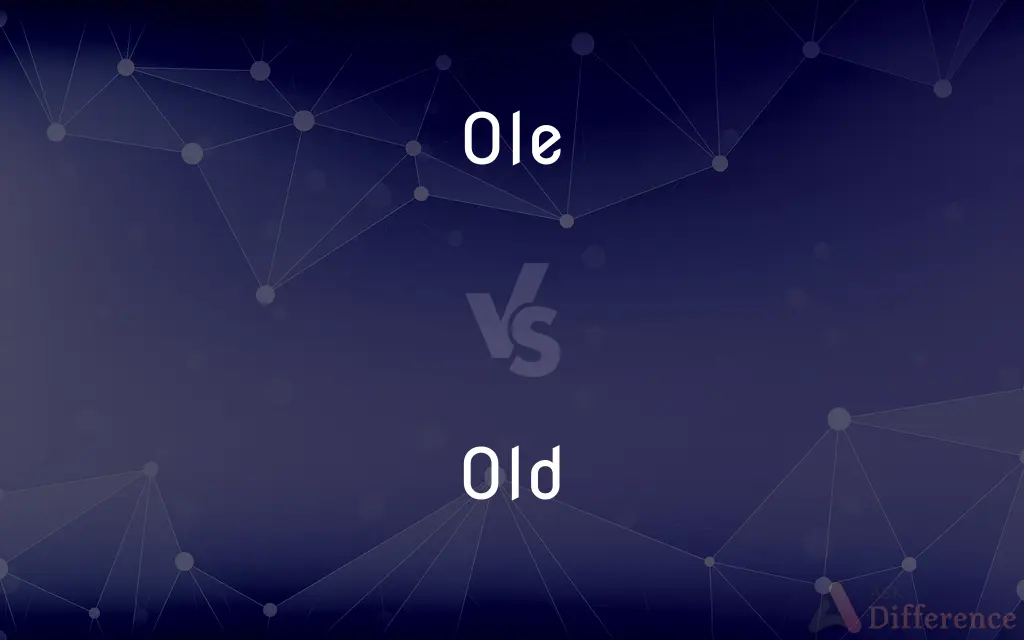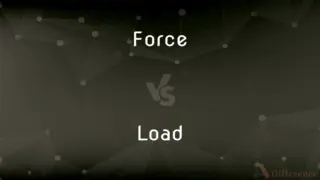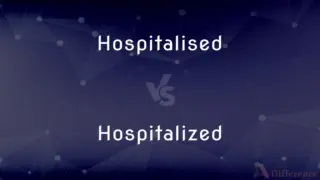Ole vs. Old — What's the Difference?
By Tayyaba Rehman — Updated on May 27, 2024
"Ole" is an informal expression of enthusiasm or affection, while "Old" refers to something of advanced age or long duration.

Difference Between Ole and Old
Table of Contents
ADVERTISEMENT
Key Differences
"Ole" often used in a cheering or affectionate context, as in "Ole Miss" or "Ole boy." It's a term of endearment or excitement. "Old," on the other hand, is an adjective that describes something or someone as having existed for a long time, showing the effects of time or age.
"Ole" has roots in various languages, including Latin and Spanish, where it's a cheer or an expression of excitement. It conveys a sense of warmth and familiarity. "Old," however, comes from the Old English "eald" or "ald," and it's used to describe something that is not new, or a person who has lived for many years.
Usage-wise, "Ole" is informal and is often used in spoken language or colloquial writing. It has a playful or affectionate tone. In contrast, "Old" is a standard adjective used in both formal and informal contexts, describing age, duration, or condition.
In terms of frequency, "Ole" is less common and often tied to specific cultural contexts or expressions. For example, it's frequently used in sports or in certain regional dialects. "Old" is a widely used term, applicable in numerous contexts to indicate age or the passage of time.
Comparison Chart
Usage
Informal
Formal and informal
ADVERTISEMENT
Context
Affection, enthusiasm
Age, antiquity
Language Origin
Latin, Spanish origins
Old English "eald" or "ald"
Tone
Playful, warm
Neutral, factual
Language
Less common, culturally specific
Common, universal
Compare with Definitions
Ole
Affectionate Term
That ole dog has been with me for years.
Old
Having lived for a long time; no longer young
The old man lay propped up on cushions
Ole
Colloquial Modifier
He's just an ole country boy at heart.
Old
Of a specified age
A seven-month-old baby
He was fourteetn years old
Ole
Informal Address
How's it going, ole buddy?
Old
Used to express affection, familiarity, or contempt
Good old Mum
I didn't like playing with silly old dolls
Ole
Cheer
The crowd shouted 'Ole!' as the matador made his move.
Old
Having lived or existed for a relatively long time; far advanced in years or life.
Ole
Celebratory Exclamation
Ole! We won the game!
Old
Relatively advanced in age
Pamela is our oldest child.
Ole
Bravo.
Old
Made long ago; in existence for many years
An old book.
Ole
A cry of "olé."
Old
Of or relating to a long life or to people who have had long lives
A ripe old age.
Ole
Pronunciation spelling of old
D'you see the ole guy sitting over there?
Old
Having or exhibiting the physical characteristics of age
A prematurely old face.
Ole
Old
That ole truck of my daddy's
Old
Having or exhibiting the wisdom of age; mature
A child who is old for his years.
Ole
Used to express excited approval.
Old
Having lived or existed for a specified length of time
She was 12 years old.
Ole
An interjection used to stir up excitement.
Old
Exhibiting the effects of time or long use; worn
An old coat.
Old
Aged
The old man shared his wisdom.
Old
Outdated
That's an old model of the phone.
Old
Belonging to the past; former
Valuation under the old rating system was inexact
Old
Known through long acquaintance; long familiar
An old friend.
Old
Skilled or able through long experience; practiced
He is an old hand at doing home repairs.
Old
Belonging to a remote or former period in history; ancient
Old fossils.
Old
Belonging to or being of an earlier time
Her old classmates.
Old
Often Old Being the earlier or earliest of two or more related objects, stages, versions, or periods.
Old
Having become slower in flow and less vigorous in action. Used of a river.
Old
Having become simpler in form and of lower relief. Used of a landform.
Old
Used as an intensive
Come back any old time. Don't give me any ol' excuse.
Old
Used to express affection or familiarity
Good ol' Sam.
Old
An individual of a specified age
A five-year-old.
Old
Old people considered as a group. Used with the
Caring for the old.
Old
Former times; yore
In days of old.
Old
Of an object, concept, relationship, etc., having existed for a relatively long period of time.
An old abandoned building
An old friend
Old
Of a living being, having lived for most of the expected years.
A wrinkled old man
Old
Of a perishable item, having existed for most of, or more than, its shelf life.
An old loaf of bread
Old
Of a species or language, belonging to a lineage that is distantly related others
The ginkgo is one of the oldest living trees
Basque is the oldest language in Europe
Old
Having been used and thus no longer new or unused.
I find that an old toothbrush is good to clean the keyboard with.
Old
Having existed or lived for the specified time.
How old are they? She’s five years old and he's seven. We also have a young teen and a two-year-old child.
My great-grandfather lived to be a hundred and one years old.
Old
(heading) Of an earlier time.
Old
Former, previous.
My new car is not as good as my old one.
A school reunion for Old Etonians
Old
That is no longer in existence.
The footpath follows the route of an old railway line.
Old
Obsolete; out-of-date.
That is the old way of doing things; now we do it this way.
Old
Familiar.
When he got drunk and quarrelsome they just gave him the old heave-ho.
Old
(UK) Being a graduate or alumnus of a school, especially a public school.
Old
Tiresome after prolonged repetition.
Your constant pestering is getting old.
Old
Said of subdued colors, particularly reds, pinks and oranges, as if they had faded over time.
Old
A grammatical intensifier, often used in describing something positive, and combined with another adjective.
We're having a good old time.
My next car will be a big old SUV.
My wife makes the best little old apple pie in Texas.
Any old
Old
(obsolete) Excessive, abundant.
Old
|invariable plural only}} People who are old; old beings; the older generation, taken as a group.
A civilised society should always look after the old in the community.
Old
(slang) A person older than oneself, especially an adult in relation to a teenager.
Old
One's parents.
I had to sneak out to meet my girlfriend and tell the olds I was going to the library.
Old
A typically dark-coloured lager brewed by the traditional top-fermentation method.
Old
Open country.
Old
Not young; advanced far in years or life; having lived till toward the end of the ordinary term of living; as, an old man; an old age; an old horse; an old tree.
Let not old age disgrace my high desire.
The melancholy news that we grow old.
Old
Not new or fresh; not recently made or produced; having existed for a long time; as, old wine; an old friendship.
Old
Formerly existing; ancient; not modern; preceding; original; as, an old law; an old custom; an old promise.
Old
Continued in life; advanced in the course of existence; having (a certain) length of existence; - designating the age of a person or thing; as, an infant a few hours old; a cathedral centuries old.
And Pharaoh said unto Jacob, How old art thou?
Old
Long practiced; hence, skilled; experienced; cunning; as, an old offender; old in vice.
Vane, young in years, but in sage counsel old.
Old
Long cultivated; as, an old farm; old land, as opposed to new land, that is, to land lately cleared.
Old
Worn out; weakened or exhausted by use; past usefulness; as, old shoes; old clothes.
Old
More than enough; abundant.
If a man were porter of hell gate, he should have old turning the key.
Old
Aged; antiquated; hence, wanting in the mental vigor or other qualities belonging to youth; - used disparagingly as a term of reproach.
Old
Old-fashioned; wonted; customary; as of old; as, the good old times; hence, colloquially, gay; jolly.
Old
Used colloquially as a term of cordiality and familiarity.
Old
Past times (especially in the phrase `in days of old')
Old
(used especially of persons) having lived for a relatively long time or attained a specific age; especially not young; often used as a combining form to indicate an age as specified as in `a week-old baby';
An old man's eagle mind
His mother is very old
A ripe old age
How old are you?
Old
Of long duration; not new;
Old tradition
Old house
Old wine
Old country
Old friendships
Old money
Old
Of an earlier time;
His old classmates
Old
(used for emphasis) very familiar;
Good old boy
Same old story
Old
Lacking originality or spontaneity; no longer new;
Moth-eaten theories about race
Old
Just preceding something else in time or order;
The previous owner
My old house was larger
Old
Of a very early stage in development;
Old English is also called Anglo Saxon
Old High German is High German from the middle of the 9th to the end of the 11th century
Old
Old in experience;
An old offender
The older soldiers
Old
Used informally especially for emphasis;
A real honest-to-god live cowboy
Had us a high old time
Went upriver to look at a sure-enough fish wheel
Old
Antique
She collected old stamps.
Old
Long-standing
Their old friendship remained strong.
Old
Former
He visited his old school.
Common Curiosities
Can "ole" be used formally?
Generally informal and colloquial.
What does "ole" signify?
Often used to express excitement or affection.
Is "old" a positive or negative term?
Can be neutral or negative, depending on context.
Can "old" describe non-living things?
Yes, like "old furniture."
What's a synonym for "old"?
Aged, ancient, or elderly.
What's an antonym for "old"?
New or young.
What's an example of "old" in a positive context?
"He shared old wisdom," where 'old' implies value.
Can "ole" be used to describe age?
Not typically; it's more about affection or excitement.
Is "ole" common in written English?
More common in speech; less so in writing.
Does "old" always imply something negative?
No, it can simply denote age or existence over time.
Can "ole" be used in professional communication?
Generally avoided in formal or professional contexts.
What's a non-age-related use of "old"?
Can indicate former status, as in "old job."
Is "ole" used worldwide?
More common in certain cultures or regions.
Are "ole" and "old" interchangeable?
No, they have different meanings and uses.
Is "ole" ever offensive?
Rarely, but context is important.
Share Your Discovery

Previous Comparison
Force vs. Load
Next Comparison
Hospitalised vs. HospitalizedAuthor Spotlight
Written by
Tayyaba RehmanTayyaba Rehman is a distinguished writer, currently serving as a primary contributor to askdifference.com. As a researcher in semantics and etymology, Tayyaba's passion for the complexity of languages and their distinctions has found a perfect home on the platform. Tayyaba delves into the intricacies of language, distinguishing between commonly confused words and phrases, thereby providing clarity for readers worldwide.













































